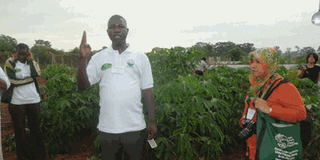Cassava farmers advised to use fertilisers for better yields

A scientist explains the different cassava varieties to participants at the international conference which focused on improving the productivity of the crop. Photo by Lominda Afedraru.
What you need to know:
While there are improved cassava varieties that are tolerant to pests and resistant to diseases, the use of fertilisers will complement efforts to boost cassava yields.
Since climatic conditions are changing and causing degradation in soil fertility, farmers specialising in growing cassava will have to go a step ahead by applying fertiliser as an agronomic practice in a bid to obtain better yields.
Crop scientists at the National Crops Resources Research Institute (Nacrri) in Namulonge have so far released 12 improved cassava varieties to farmers but they are emphasising the use of fertiliser for the best harvest results.
The head of cassava research at Namulong, Dr Anthony Bua while addressing science journalists at the International Cassava Conference in Kampala recently said crop scientists in Namulonge are developing improved cassava varieties using both conventional and biotechnology tools.
Increasing output
The major aim is increasing farmers yields but factors such as pests and diseases cannot be ruled out.
The scientists have released 19 cassava varieties named Nase1 through to Nase 19 that are resistant to Cassava Mosaic Virus (CMV) and tolerant to Cassava Brown Streak Disease (CBSD).
However, according to Dr Bua, since the climatic conditions keep changing, new vector diseases keep emerging therefore the need for farmers to apply fertiliser to improve on the soil fertility for high quality and quantity.
“Crop scientists for a long time have been saying cassava cannot grow without the use of fertiliser but we have now proved that a farmer who uses fertiliser in his or her cassava garden will yield 15 to 30 tonnes per hectare.
This, therefore, means we should encourage farmers to use fertiliser in soils where the fertility is low for purposes of doubling their output,” Dr Bua said. The team is also encouraging cassava farmers to adopt agronomic practices such as crop rotation, crop variety control, intercropping and use of manure among others.
“Although Uganda is one of the countries in Sub-Saharan Africa with the highest level of soil nutrient, fertiliser use remain very low and yet increased use of fertiliser in combination with improved agricultural technologies, such as improved high yielding seeds including improved cassava varieties, good agronomic practices and irrigation can help improve agricultural productivity,” Dr Bua said.
Meet demand
He stressed that farmers should venture into commercialisation of cassava since it has a lot of industrial uses. These include use in breweries, paper processors, glue processors and small scale industries producing potent gin.
Citing an example of Nile Breweries, which has partnered with a Mozambican company which produces beer out of cassava, Bua said farmers need to meet the rising demand for their produce by producing more cassava. Dr Bua says if cassava grown in Uganda is utilised well, it will save the country $17m (Shs41.9b) from importation of fuel because the same product can be used for production of fuel and other sources of energy such as biogas among others.
Other values of cassava according to Dr Bua is that, it can be used for producing white sugar with high quality fructose which can be used in beverage industries for processing soft drinks.
Better crops
Mr Saverino Poro, a lab technician in cassava breeding at Namulonge, said his team is encouraging farmers to grow Nase14 because it has consistently proved resistant against CMV and tolerant to CBSD.
Its yield is relatively high compared to other varieties because it yields 30 to 40 tonnes per hectare.
He said a good number of farmers are currently growing this variety in most cassava growing regions in the country although many prefer to grow the traditional varieties which are susceptible to CBS disease.



